牛津译林版中考复习讲义之动名词,不定式以及练习
- 格式:docx
- 大小:43.82 KB
- 文档页数:8
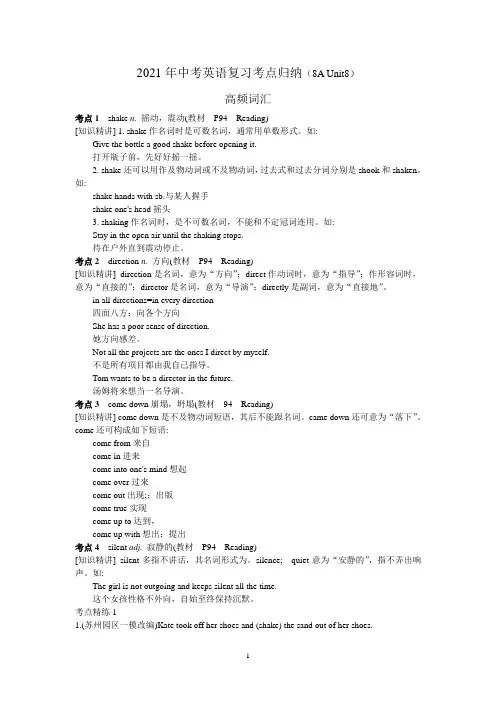
2021年中考英语复习考点归纳(8A Unit8)高频词汇考点1 shake n. 摇动,震动(教材P94 Reading)[知识精讲] 1. shake作名词时是可数名词,通常用单数形式。
如:Give the bottle a good shake before opening it.打开瓶子前,先好好摇一摇。
2. shake还可以用作及物动词或不及物动词,过去式和过去分词分别是shook和shaken。
如:shake hands with sb.与某人握手shake one's head摇头3. shaking作名词时,是不可数名词,不能和不定冠词连用。
如:Stay in the open air until the shaking stops.待在户外直到震动停止。
考点2direction n.方向(教材P94 Reading)[知识精讲] direction是名词,意为“方向”;direct作动词时,意为“指导”;作形容词时,意为“直接的”;director是名词,意为“导演”;directly是副词,意为“直接地”。
in all directions=in every direction四面八方;向各个方向She has a poor sense of direction.她方向感差。
Not all the projects are the ones I direct by myself.不是所有项目都由我自己指导。
Tom wants to be a director in the future.汤姆将来想当一名导演。
考点3 come down崩塌,坍塌(教材94 Reading)[知识精讲] come down是不及物动词短语,其后不能跟名词。
came down还可意为“落下”。
come还可构成如下短语:come from来自come in进来come into one's mind想起come over过来come out出现;;出版come true实现come up to达到,come up with想出;提出考点4silent adj.寂静的(教材P94 Reading)[知识精讲] silent多指不讲话,其名词形式为。
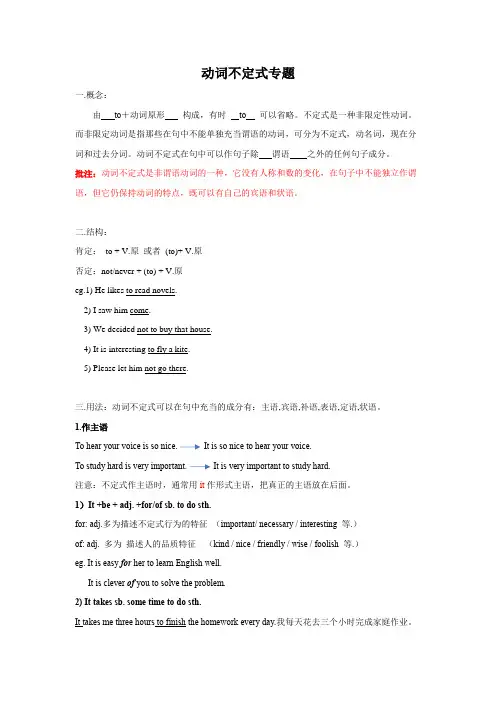
动词不定式专题一.概念:由to+动词原形构成,有时to 可以省略。
不定式是一种非限定性动词。
而非限定动词是指那些在句中不能单独充当谓语的动词,可分为不定式,动名词,现在分词和过去分词。
动词不定式在句中可以作句子除谓语之外的任何句子成分。
批注:动词不定式是非谓语动词的一种,它没有人称和数的变化,在句子中不能独立作谓语,但它仍保持动词的特点,既可以有自己的宾语和状语。
二.结构:肯定:to + V.原或者(to)+ V.原否定:not/never + (to) + V.原eg.1) He likes to read novels.2) I saw him come.3) We decided not to buy that house.4) It is interesting to fly a kite.5) Please let him not go there.三.用法:动词不定式可以在句中充当的成分有:主语,宾语,补语,表语,定语,状语。
1.作主语To hear your voice is so nice. It is so nice to hear your voice.To study hard is very important. It is very important to study hard.注意:不定式作主语时,通常用it作形式主语,把真正的主语放在后面。
1)It +be + adj. +for/of sb. to do sth.for: adj.多为描述不定式行为的特征(important/ necessary / interesting 等.)of: adj. 多为描述人的品质特征(kind / nice / friendly / wise / foolish 等.)eg. It is easy for her to learn English well.It is clever of you to solve the problem.2) It takes sb. some time to do sth.It takes me three hours to finish the homework every day.我每天花去三个小时完成家庭作业。
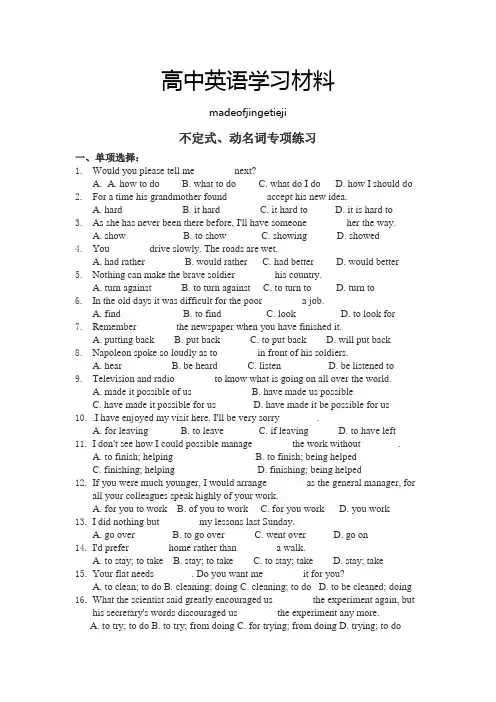
高中英语学习材料madeofjingetieji不定式、动名词专项练习一、单项选择:1.Would you please tell me _______ next?A.A. how to doB. what to doC. what do I doD. how I should do2.For a time his grandmother found _______ accept his new idea.A. hardB. it hardC. it hard toD. it is hard to3.As she has never been there before, I'll have someone _______ her the way.A. showB. to showC. showingD. showed4.You _______ drive slowly. The roads are wet.A. had ratherB. would ratherC. had betterD. would better5.Nothing can make the brave soldier _______ his country.A. turn againstB. to turn againstC. to turn toD. turn to6.In the old days it was difficult for the poor _______ a job.A. findB. to findC. lookD. to look for7.Remember _______ the newspaper when you have finished it.A. putting backB. put backC. to put backD. will put back8.Napoleon spoke so loudly as to _______ in front of his soldiers.A. hearB. be heardC. listenD. be listened to9.Television and radio _______ to know what is going on all over the world.A. made it possible of usB. have made us possibleC. have made it possible for usD. have made it be possible for us10..I have enjoyed my visit here. I'll be very sorry _______.A. for leavingB. to leaveC. if leavingD. to have left11.I don't see how I could possible manage _______ the work without _______.A. to finish; helpingB. to finish; being helpedC. finishing; helpingD. finishing; being helped12.If you were much younger, I would arrange _______ as the general manager, forall your colleagues speak highly of your work.A. for you to workB. of you to workC. for you workD. you work13.I did nothing but _______ my lessons last Sunday.A. go overB. to go overC. went overD. go on14.I'd prefer _______ home rather than _______ a walk.A. to stay; to takeB. stay; to takeC. to stay; takeD. stay; take15.Your flat needs _______. Do you want me _______ it for you?A. to clean; to doB. cleaning; doingC. cleaning; to doD. to be cleaned; doing16.What the scientist said greatly encouraged us _______ the experiment again, buthis secretary's words discouraged us _______ the experiment any more.A. to try; to doB. to try; from doingC. for trying; from doingD. trying; to do17._______ water before breakfast seemed to them a rule never _______.A. To get; breaksB. To get; to breakC. Getting; breaksD. Get; to break18.Mr. Green has never smoked any more since his wife _______ him _______.A. suggested; to give it upB. persuaded; to give up itC. advised; to give it upD. persuaded; to give it up19.You must do something to prevent your house _______.A. to be broken inB. from being broken inC. to break inD. from breaking in20.They insisted on _______ another chance to try.A. givenB. givingC. being givenD. to be given21.Only _______ English doesn't mean _______ the language.A. to learn;to learnB. learning;learningC. learning about;learnD. learning about;learning22.She decided to devote herself _______ the problem of old age.A. to studyB. studyingC. to studyingD. study23.Grandma said that she had a lot of trouble _______ your handwriting.A. to readB. to seeC. reading C. in seeing24.We appreciate _______ us to the ball.A. them to inviteB. to inviteC. their invitingD. being invited25.Would you mind _______ quiet for a moment? I'm trying _______ a form.A. keeping;filling outB. to keep;to fill outC. keeping;to fill outD. to keep;filling out26.Anything worth _______ is worthy of _______ well.A. doing;being doneB. doing;doingC. to be done;to be doneD. to be done;being done27._______ his mother, the baby could not help _______.A. To see;to laughB. Seeing;to laughC. Seeing;laughingD. To see;laughing28.It's no use _______ so much money on clothes.A. spendB. spentC. spendingD. being spent29.If he succeeded ____ a job, his children wouldn't be suffering from hunger now.A. to findB. to look forC. in findingD. in looking for二、填入动名词的适当形式:1.Can you imagine yourself ____________ in a lonely island? (stay)2.I can't understand your _____________ at that poor child. (laugh)3.She didn't mind __________________ overtime. (work)4. We are looking forward to Mary's __________________. (come)5.She ought to be praised instead of __________________. (criticize).三、将下列句子译成英语:1.我最喜欢的运动是游泳2.今天去没有用, 他不会在家.3.你写完作文了吗?4.请原谅我来晚了.5.他不声不响地走了进来.6.他走进来了, 没有被看见.四、把下列的定语从句和同位语从句改为不定式短语1.There are still a lot of difficulties we have to overcome.2.Before the machines leave the factory, there is a series of tests that must be passed.3.At the end of the speech he expressed the desire that he should come and work in China someday.4.They signed an agreement that they should expand the trade between the two countries.5.The commander gave orders that we should cross the river.。

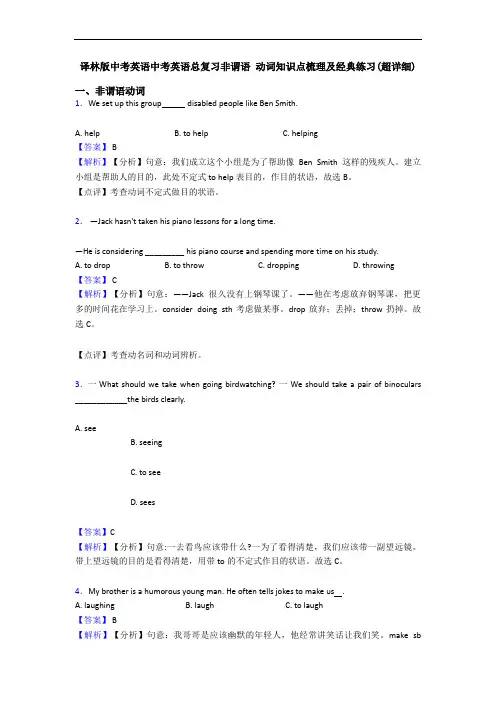
译林版中考英语中考英语总复习非谓语动词知识点梳理及经典练习(超详细)一、非谓语动词1.We set up this group disabled people like Ben Smith.A. helpB. to helpC. helping【答案】 B【解析】【分析】句意:我们成立这个小组是为了帮助像Ben Smith这样的残疾人。
建立小组是帮助人的目的,此处不定式to help表目的,作目的状语,故选B。
【点评】考查动词不定式做目的状语。
2.—Jack hasn't taken his piano lessons for a long time.—He is considering _________ his piano course and spending more time on his study.A. to dropB. to throwC. droppingD. throwing【答案】 C【解析】【分析】句意:——Jack很久没有上钢琴课了。
——他在考虑放弃钢琴课,把更多的时间花在学习上。
consider doing sth考虑做某事。
drop放弃;丢掉;throw扔掉。
故选C。
【点评】考查动名词和动词辨析。
3.一What should we take when going birdwatching? 一 We should take a pair of binoculars ____________the birds clearly.A. seeB. seeingC. to seeD. sees【答案】C【解析】【分析】句意:一去看鸟应该带什么?一为了看得清楚,我们应该带一副望远镜。
带上望远镜的目的是看得清楚,用带to的不定式作目的状语。
故选C。
4.My brother is a humorous young man. He often tells jokes to make us .A. laughingB. laughC. to laugh【答案】 B【解析】【分析】句意:我哥哥是应该幽默的年轻人,他经常讲笑话让我们笑。
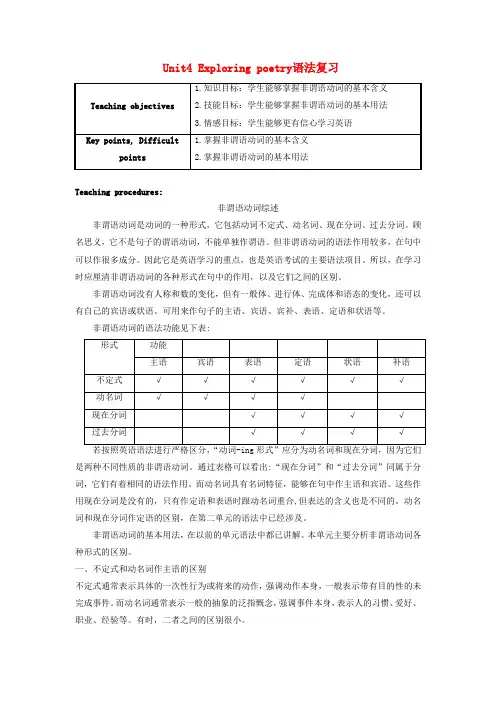
Unit4 Exploring poetry语法复习Teaching procedures:非谓语动词综述非谓语动词是动词的一种形式,它包括动词不定式、动名词、现在分词、过去分词。
顾名思义,它不是句子的谓语动词,不能单独作谓语。
但非谓语动词的语法作用较多,在句中可以作很多成分。
因此它是英语学习的重点,也是英语考试的主要语法项目。
所以,在学习时应厘清非谓语动词的各种形式在句中的作用,以及它们之间的区别。
非谓语动词没有人称和数的变化,但有一般体、进行体、完成体和语态的变化,还可以有自己的宾语或状语。
可用来作句子的主语、宾语、宾补、表语、定语和状语等。
非谓语动词的语法功能见下表:是两种不同性质的非谓语动词。
通过表格可以看出:“现在分词”和“过去分词”同属于分词,它们有着相同的语法作用。
而动名词具有名词特征,能够在句中作主语和宾语。
这些作用现在分词是没有的,只有作定语和表语时跟动名词重合,但表达的含义也是不同的。
动名词和现在分词作定语的区别,在第二单元的语法中已经涉及。
非谓语动词的基本用法,在以前的单元语法中都已讲解。
本单元主要分析非谓语动词各种形式的区别。
一、不定式和动名词作主语的区别不定式通常表示具体的一次性行为或将来的动作,强调动作本身,一般表示带有目的性的未完成事件。
而动名词通常表示一般的抽象的泛指慨念,强调事件本身,表示人的习惯、爱好、职业、经验等。
有时,二者之间的区别很小。
Smoking is forbidden here.此处禁止吸烟。
(抽象泛指)Collecting stamps is his hobby.集邮是他的业余爱好。
(习惯爱好)Teaching children music is her work.教孩子们音乐是她的工作。
(工作职业)Driving a car during the rush hour is tiring.在交通高峰期开车让人疲倦。
( 经验) To visit Australia is my next goal.游览澳大利亚是我的下一个目标。
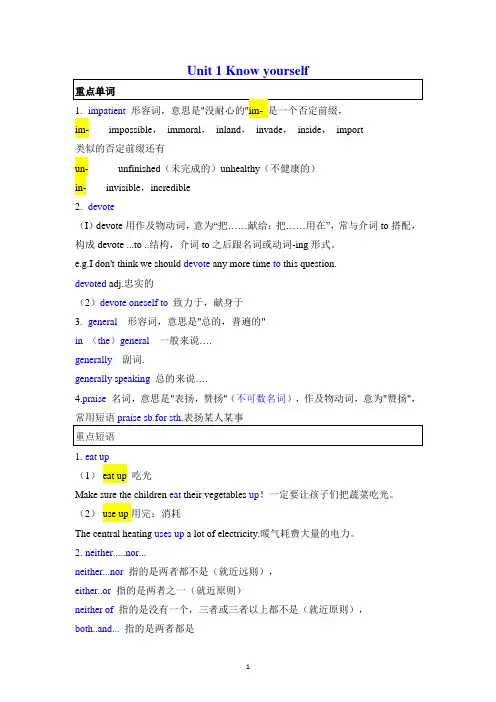
重点单词1.impatient形容词,意思是"没耐心的"im- 是一个否定前缀,im- impossible,immoral,inland,invade,inside,import类似的否定前缀还有un- unfinished(未完成的)unhealthy(不健康的)in- invisible,incredible2.devote(I)devote用作及物动词,意为“把……献给;把……用在”,常与介词to搭配,构成devote ...to ..结构,介词to之后跟名词或动词-ing形式。
e.g.I don't think we should devote any more time to this question.devoted adj.忠实的(2)devote oneself to致力于,献身于3.general 形容词,意思是"总的,普遍的"in (the)general一般来说….generally 副词.generally speaking 总的来说….4.praise 名词,意思是"表扬,赞扬"(不可数名词),作及物动词,意为"赞扬",常用短语praise sb.for sth.表扬某人某事重点短语1.eat up(1)eat up 吃光Make sure the children eat their vegetables up!一定要让孩子们把蔬菜吃光。
(2)use up用完;消耗The central heating uses up a lot of electricity.暖气耗费大量的电力。
2.neither.....nor...neither...nor 指的是两者都不是(就近远则),either..or指的是两者之一(就近原则)neither of 指的是没有一个,三者或三者以上都不是(就近原则),both..and...指的是两者都是就近原则指的是be 动词和行为动词的用法取决于距离较近的主语的单复数。

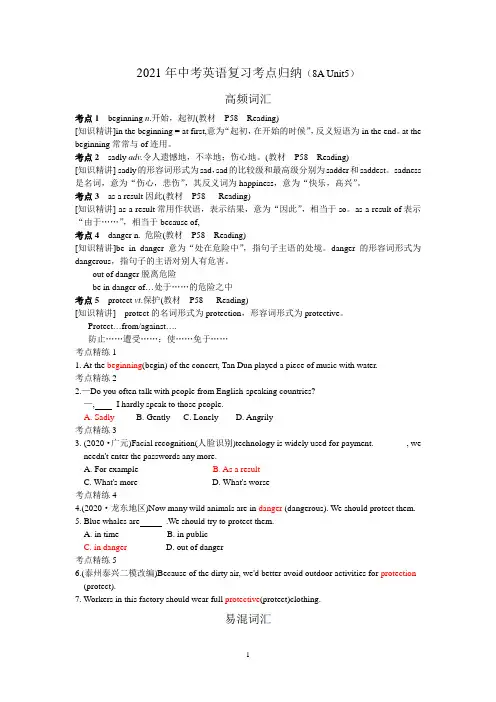
2021年中考英语复习考点归纳(8A Unit5)高频词汇考点1beginning n.开始,起初(教材P58 Reading)[知识精讲]in the beginning = at first,意为“起初,在开始的时候”,反义短语为in the end。
at the beginning常常与of连用。
考点2sadly adv.令人遗憾地,不幸地;伤心地。
(教材P58 Reading)[知识精讲] sadly的形容词形式为sad,sad的比较级和最高级分别为sadder和saddest。
sadness 是名词,意为“伤心,悲伤”,其反义词为happiness,意为“快乐,高兴”。
考点3 as a result因此(教材P58 Reading)[知识精讲] as a result常用作状语,表示结果,意为“因此”,相当于so。
as a result of表示“由于……”,相当于because of,考点4 danger n. 危险(教材P58 Reading)[知识精讲]be in danger意为“处在危险中”,指句子主语的处境。
danger的形容词形式为dangerous,指句子的主语对别人有危害。
out of danger脱离危险be in danger of…处于……的危险之中考点5 protect vt.保护(教材P58 Reading)[知识精讲] protect的名词形式为protection,形容词形式为protective。
Protect…from/against….防止……遭受……;使……免于……考点精练11. At the beginning(begin) of the concert, Tan Dun played a piece of music with water.考点精练22.—Do you often talk with people from English-speaking countries?—, I hardly speak to those people.A. SadlyB. GentlyC. LonelyD. Angrily考点精练33. (2020·广元)Facial recognition(人脸识别)technology is widely used for payment._______ , we needn't enter the passwords any more.A. For exampleB. As a resultC. What's moreD. What's worse考点精练44.(2020·龙东地区)Now many wild animals are in danger (dangerous). We should protect them.5. Blue whales are .We should try to protect them.A. in timeB. in publicC. in dangerD. out of danger考点精练56.(泰州泰兴二模改编)Because of the dirty air, we'd better avoid outdoor activities for protection (protect).7. Workers in this factory should wear full protective(protect)clothing.易混词汇考点1die, dying, death与dead(教材P56 Comic strip)[知识精讲] 1. die是动词,意为“死,死亡”,是非延续性动词,不能与表示一段时间的状语连用。
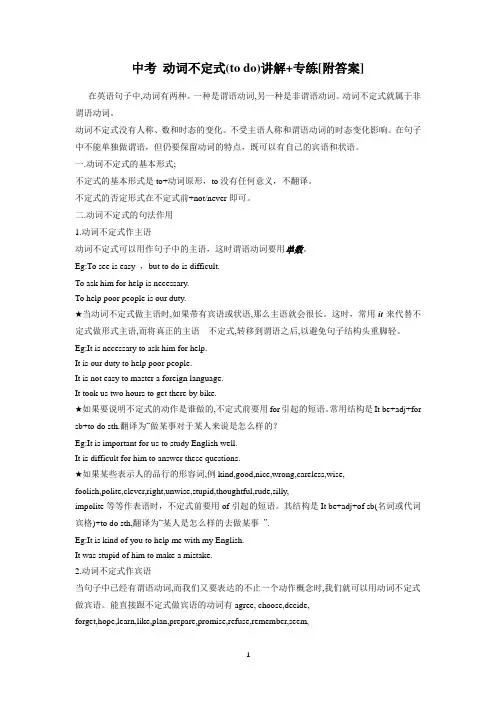
中考动词不定式(to do)讲解+专练[附答案]在英语句子中,动词有两种。
一种是谓语动词,另一种是非谓语动词。
动词不定式就属于非谓语动词。
动词不定式没有人称、数和时态的变化。
不受主语人称和谓语动词的时态变化影响。
在句子中不能单独做谓语,但仍要保留动词的特点,既可以有自己的宾语和状语。
一.动词不定式的基本形式;不定式的基本形式是to+动词原形,to没有任何意义,不翻译。
不定式的否定形式在不定式前+not/never即可。
二.动词不定式的句法作用1.动词不定式作主语动词不定式可以用作句子中的主语,这时谓语动词要用单数。
Eg:To see is easy ,but to do is difficult.To ask him for help is necessary.To help poor people is our duty.★当动词不定式做主语时,如果带有宾语或状语,那么主语就会很长。
这时,常用it来代替不定式做形式主语,而将真正的主语---不定式,转移到谓语之后,以避免句子结构头重脚轻。
Eg:It is necessary to ask him for help.It is our duty to help poor people.It is not easy to master a foreign language.It took us two hours to get there by bike.★如果要说明不定式的动作是谁做的,不定式前要用for引起的短语。
常用结构是It be+adj+for sb+to do sth.翻译为“做某事对于某人来说是怎么样的?Eg:It is important for us to study English well.It is difficult for him to answer these questions.★如果某些表示人的品行的形容词,例kind,good,nice,wrong,careless,wise,foolish,polite,clever,right,unwise,stupid,thoughtful,rude,silly,impolite等等作表语时,不定式前要用of引起的短语。
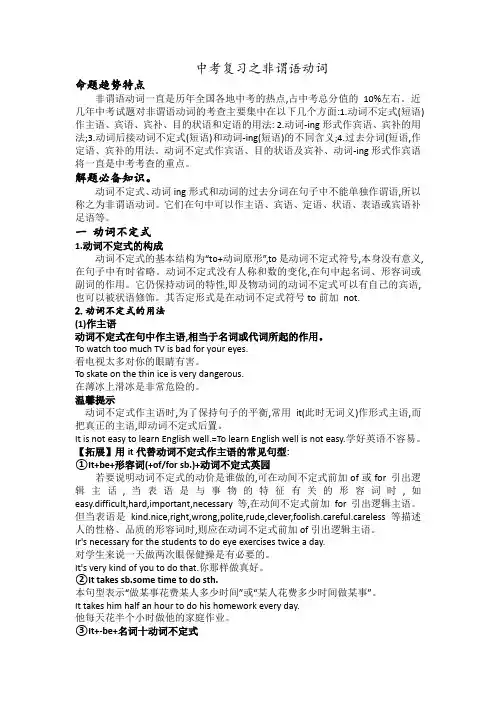
中考复习之非谓语动词命题趋势特点非谓语动词一直是历年全国各地中考的热点,占中考总分值的10%左右。
近几年中考试题对非谓语动词的考查主要集中在以下几个方面:1.动词不定式(短语)作主语、宾语、宾补、目的状语和定语的用法: 2.动词-ing形式作宾语、宾补的用法;3.动词后接动词不定式(短语)和动词-ing(短语)的不同含义;4.过去分词(短语,作定语、宾补的用法。
动词不定式作宾语、目的状语及宾补、动词-ing形式作宾语将一直是中考考查的重点。
解题必备知识。
动词不定式、动词ing形式和动词的过去分词在句子中不能单独作谓语,所以称之为非谓语动词。
它们在句中可以作主语、宾语、定语、状语、表语或宾语补足语等。
一动词不定式1.动词不定式的构成动词不定式的基本结构为“to+动词原形”,to是动词不定式符号,本身没有意义,在句子中有时省略。
动词不定式没有人称和数的变化,在句中起名词、形容词或副词的作用。
它仍保持动词的特性,即及物动词的动词不定式可以有自己的宾语,也可以被状语修饰。
其否定形式是在动词不定式符号to前加not.2.动词不定式的用法(1)作主语动词不定式在句中作主语,相当于名词或代词所起的作用。
To watch too much TV is bad for your eyes.看电视太多对你的眼睛有害。
To skate on the thin ice is very dangerous.在薄冰上滑冰是非常危险的。
温馨提示动词不定式作主语时,为了保持句子的平衡,常用it(此时无词义)作形式主语,而把真正的主语,即动词不定式后置。
It is not easy to learn English well.=To learn English well is not easy.学好英语不容易。
【拓展】用it代替动词不定式作主语的常见句型:①It+be+形容词(+of/for sb.)+动词不定式英园若要说明动词不定式的动价是谁做的,可在动间不定式前加of或for 引出逻辑主话,当表语是与事物的特征有关的形容词时,如easy.difficult,hard,important,necessary等,在动间不定式前加for引出逻辑主语。
2021年中考英语复习考点归纳(9B Unit2)高频词汇考点1 Invent vt.发明(教材P20 Comic strip)[知识精讲] invent作动词,它的名词形式有:inventor,意为“发明家”;invention,意为“发明”。
如:The computer is a great invention in the modern world.在现代世界,电脑是一项伟大的发明。
考点2 control n. 控制、支配(教材P22 Reading)[知识精讲] control既可以作名词,也可以作动词。
如:out of control失去拉制in control在掌控之中under the control of…在……的拉制/管理下考点3 increase vt.增加(教材P32 Task)[知识精讲] increase的基本意思是“增加,扩大”,可指由于自然繁殖导致数目的增加,也可指人为地增大体积。
注意:increase后接介词by时,表示增加的具体数量;后接介词in时,表示在某方面的增加;后接介词to时,表示“增加到……”;后接介词with时,表示“随……增长”。
We must increase the level of our skills.我们必须提高我们的技术水平。
考点精练11.—Who the computer?—Sorry, I've no idea. But it has changed the world greatly.A. inventedB. discoveredC. madeD. played2.—Modern technology is developing so quickly!—I agree with you. With the of the robot, people will have more free time to relax A. situation B. instruction C. condition D. invention考点精练23. Site lost of her car on the ice.A. controlB. powerC. strengthD. energy考点精练34. ( 2020·抚顺、本溪、辽阳)Developing good reading habits can our reading speed.A. reviewB. receiveC. spreadD. increase5. The Earth is becoming more and more crowded and polluted because of the rapid in population.A. increaseB. reductionC. weaknessD. strength易混词汇考点take pride in与比proud of(教材P23 Reading)[知识精讲] 从语法上讲,take pride in相当于be proud of,两者都是“以……为荣”的意思,后面可以接人或物作宾语。
语法专项一———时态1.2. ▲并不是遇到短动词就要改为长动词,没有段时间不用变。
You can't find Tom here. He has already left. (此处left 不用换作 been away) 3. ▲并不是遇到段时间就一定用现完,动作没持续到现在仍然用过去时。
如: Hi, Jill. Have you graduated from college?如: I live in China now, but I (teach) Chinese in France for 3 years.4. 追问何时何地发生用过去时 I have been to Beijing twice.When did you go there?5. have been to, have been in, have gone to 区别。
语法专项二———被动语态考点二被动语态的用法1. 不知道或没有必要说明动作的执行者是谁。
Some new puters were stolen last night. 昨晚一些新电脑被偷了。
2. 强调动作的承受者,而不强调动作的执行者。
The homework must be handed in on time. 作业必须按时交上来。
3.说话或发表意见时,为了显得客观公正,也常用被动语态。
常用句型:It is said that… 据说…… It is reported that…据报道……It is hoped that… 希望…… It is believed that… 人们相信……It is well known that …众所周知… … It is supposed that …据推测说… …⑴It is said that one day he climbed to the top of a house and ……“据说⑵It was reported that her mother died of SARS. “有人说,据说’考点三主动语态转化为被动语态的方法1. 把主动语态的宾语变为被动语态的主语。
2022年中考英语二轮复习讲义与练习非谓语动词班级__________姓名_____________学号____________动词的非谓语形式包括动词不定式、动名词和分词三种形式;其中分词又包含现在分词和过去分词两种形式。
它们在句子中不能单独作谓语。
一、动词不定式①形式:动词不定式基本形式由“不定式记号to+动词原形”构成。
它的否定形式只要在“to” 前面加上“not”。
它的疑问形式是:“wh-疑问词+to+动词原形”。
*它的被动形式:“to be +过去分词”。
*它的完成形式:“to have +过去分词”。
②动词不定式具有名词、形容词和副词的特征,即可以在句子中作主语、宾语、定语、状语、表语和宾语补足语。
但不定式也保留动词的某些特征,即不定式后面可以跟宾语、表语和状语。
动词不定式加上相关成分就构成不定式短语。
③动词不定式可以放在谓语前句子作主语。
但是通常将作主语的动词不定式或不定式短语放在谓语后面,而在主语位置用“it”作形式主语(有时在不定式的前面还会用for sb.表示不定式的逻辑主语)。
如:To help animals is helping people.(帮助动物就是帮助人)It is very difficult (for us) to learn Chinese well.((对于我们而言)学好汉语是非常的困难)It took me half an hour to work out this problem.(解出这道题花了我一个小时的时间)④动词不定式可以作谓语动词(及物动词)的宾语。
如:He does not know which one to take.(他不知道该选哪个)Tell me how to get to the station.(告诉我怎么样去火车站)She asked me what to do for today’s homework.(她问我今天家庭作业做什么)Can you teach me how to search the internet?(你能教我怎样上网吗?)不定式作宾语而后面又有宾语补足语时,通常用it代替作形式宾语,而不定式则后置。
不定式、动名词专项练习一、单项选择:1.Would you please tell me _______ next?A.A. how to doB. what to doC. what do I doD. how I should do2.For a time his grandmother found _______ accept his new idea.A. hardB. it hardC. it hard toD. it is hard to3.As she has never been there before, I'll have someone _______ her the way.A. showB. to showC. showingD. showed4.You _______ drive slowly. The roads are wet.A. had ratherB. would ratherC. had betterD. would better5.Nothing can make the brave soldier _______ his country.A. turn againstB. to turn againstC. to turn toD. turn to6.In the old days it was difficult for the poor _______ a job.A. findB. to findC. lookD. to look for7.Remember _______ the newspaper when you have finished it.A. putting backB. put backC. to put backD. will put back8.Napoleon spoke so loudly as to _______ in front of his soldiers.A. hearB. be heardC. listenD. be listened to9.Television and radio _______ to know what is going on all over the world.A. made it possible of usB. have made us possibleC. have made it possible for usD. have made it be possible for us10..I have enjoyed my visit here. I'll be very sorry _______.A. for leavingB. to leaveC. if leavingD. to have left11.I don't see how I could possible manage _______ the work without _______.A. to finish; helpingB. to finish; being helpedC. finishing; helpingD. finishing; being helped12.If you were much younger, I would arrange _______ as the general manager, forall your colleagues speak highly of your work.A. for you to workB. of you to workC. for you workD. you work13.I did nothing but _______ my lessons last Sunday.A. go overB. to go overC. went overD. go on14.I'd prefer _______ home rather than _______ a walk.A. to stay; to takeB. stay; to takeC. to stay; takeD. stay; take15.Your flat needs _______. Do you want me _______ it for you?A. to clean; to doB. cleaning; doingC. cleaning; to doD. to be cleaned; doing16.What the scientist said greatly encouraged us _______ the experiment again, buthis secretary's words discouraged us _______ the experiment any more.A. to try; to doB. to try; from doingC. for trying; from doingD. trying; to do17._______ water before breakfast seemed to them a rule never _______.A. To get; breaksB. To get; to breakC. Getting; breaksD. Get; to break18.Mr. Green has never smoked any more since his wife _______ him _______.A. suggested; to give it upB. persuaded; to give up itC. advised; to give it upD. persuaded; to give it up19.You must do something to prevent your house _______.A. to be broken inB. from being broken inC. to break inD. from breaking in20.They insisted on _______ another chance to try.A. givenB. givingC. being givenD. to be given21.Only _______ English doesn't mean _______ the language.A. to learn;to learnB. learning;learningC. learning about;learnD. learning about;learning22.She decided to devote herself _______ the problem of old age.A. to studyB. studyingC. to studyingD. study23.Grandma said that she had a lot of trouble _______ your handwriting.A. to readB. to seeC. reading C. in seeing24.We appreciate _______ us to the ball.A. them to inviteB. to inviteC. their invitingD. being invited25.Would you mind _______ quiet for a moment? I'm trying _______ a form.A. keeping;filling outB. to keep;to fill outC. keeping;to fill outD. to keep;filling out26.Anything worth _______ is worthy of _______ well.A. doing;being doneB. doing;doingC. to be done;to be doneD. to be done;being done27._______ his mother, the baby could not help _______.A. To see;to laughB. Seeing;to laughC. Seeing;laughingD. To see;laughing28.It's no use _______ so much money on clothes.A. spendB. spentC. spendingD. being spent29.If he succeeded ____ a job, his children wouldn't be suffering from hunger now.A. to findB. to look forC. in findingD. in looking for二、填入动名词的适当形式:1.Can you imagine yourself ____________ in a lonely island? (stay)2.I can't understand your _____________ at that poor child. (laugh)3.She didn't mind __________________ overtime. (work)4. We are looking forward to Mary's __________________. (come)5.She ought to be praised instead of __________________. (criticize).三、将下列句子译成英语:1.我最喜欢的运动是游泳2.今天去没有用, 他不会在家.3.你写完作文了吗?4.请原谅我来晚了.5.他不声不响地走了进来.6.他走进来了, 没有被看见.四、把下列的定语从句和同位语从句改为不定式短语1.There are still a lot of difficulties we have to overcome.2.Before the machines leave the factory, there is a series of tests that must be passed.3.At the end of the speech he expressed the desire that he should come and work in China someday.4.They signed an agreement that they should expand the trade between the two countries.5.The commander gave orders that we should cross the river.。
中考复习之动名词,不定式以及练习动名词知识点以及练习语法要点动名词是非谓语动词的一种,不仅具有动词的性质,还具有名词的性质,在句中可以用作主语、表语、宾语、定语、宾语补足语等。
动名词有时态和语态的变化。
一、动名词的作用1.作主语Smoking is not good for your health.吸烟对你身体不好。
Fishing can give people a lot of fun.钓鱼为人们提供了很多乐趣。
2.作宾语①作某些谓语动词的宾语。
常见的这些动词主要有:keep(保持),finish(结束),enjoy(喜欢),advise(劝告),suggest(建议),mind(介意),practise(练习),consider(考虑),imagine(想象),allow(准许),can't help(禁不住)等。
I have finished doing my homework.我已经写完了作业。
He did enjoy swimming.他的确喜欢游泳。
②作介词的宾语。
Mary is good at dancing.玛丽擅长跳舞。
I am looking forward to meeting you again soon.我盼望着早日再次见到你。
3.作定语There is a swimming pool behind our school.我们学校后面有一个游泳池。
I saw her in the reading room yesterday.我昨天在阅览室里看见了她。
4.作表语His job is telling stories to children.他的工作是给孩子们讲故事。
His favorite sport is playing football.他最喜爱的运动是踢足球。
二、动名词的时态和语态1.时态如果动名词的动作发生在谓语动词之前,这时候需要使用动名词的完成时,其构成是having+过去分词。
I really regret having done such a silly thing.我真后悔干了这样的傻事。
(傻事已经做过了,现在感到后悔。
)He forgot having turned off the light.他忘记已经把灯关掉了。
(关灯的动作发生在forget 之前。
)2.语态当动名词的逻辑主语是动名词的接受者而不是发起者时,这时候需要使用动名词的被动形式。
动名词被动形式的构成是being+过去分词。
He could not bear being made fool of like this.他不能忍受别人这样戏弄他。
Upon being questioned,he denied having written the article.在被盘问时,他不承认写过这篇文章。
三、动名词的否定形式动名词的否定形式是在动名词前(完成形式在having前,被动形式在being前,加否定词not.Would you mind not smoking here?你介意不在这里吸烟吗?He said sorry for not answering my question.他因为没有回答我的问题说对不起。
四、既可接动名词又可接不定式作宾语的动词1.常见的既可接动名词,又可接不定式、且含义相同的动词这类动词主要有:like(喜欢),love(喜欢),hate(僧恨),prefer(宁可),begin(开始),start(开始),continue(继续)等。
He likes swimming.He likes to swim.他喜欢游泳。
He began doing his homework ten minutes ago.He began to do his homework ten minutes ago.他十分钟前开始写作业。
2.常见的既可接动名词又可接不定式但含义不同的动词这类动词主要有:stop,remember,forget,try,regret,以及动词短语go on① stop doing sth.表示“停止正在做的事情”stop to do sth.表示“停下(一件事)而去做另外一件事”Stop talking,please.请不要说话了!She stopped to talk.她停了下来,开始说话。
② remember doing sth.表示“记着做过某事(已做)”remember to do sth.表示“记住去做某事(将要去做)”I remember turning off the light.我记得关过灯了。
Please do remember to turn off the light.千万记着要去关灯。
③forget doing sth.表示“忘记曾做了某事(已做过了)”forget to do sth.表示“忘记要去做某事(还没有做)”I forget paying the bill.我忘了已经付过钱了。
I forget to pay the bill.我忘了去付钱了。
④ regret doing sth.表示“后悔做过了某事”regret to do sth.表示“遗憾要去做某事”I regretted telling him the truth.我后悔告诉了他事情的真相。
I regret to tell you that your mother is seriously ill.我非常遗憾地告诉你你妈妈病得很重。
⑤try doing sth.表示“试着做某事”try to do sth.表示“设法去做,努力去做”I tried writing letters in English.我试着用英语写信。
I will try to answer your questions next week.我将设法下周回答你的问题。
⑥ go on doing sth.表示“继续做原来做的事”go on to do sth.表示“做完某事后接着做另一件”He went on telling his stories.他接着讲他的故事。
After he had finished his homework,he went on to read novel.做完作业后,他接着读小说。
习题1.Would you mind_______door for me? It is very cold.A.closeB.closing2.I am looking forward to_______the army.A. joinB.joinedC.joiningD.to join3.The teacher asked me_______it again.A.not to doB.to not doC.not doingD.doing not4.My father really enjoys________after dinner even though he knows ______is not good for his health.A.smoking;smokeB.smoke;smokingC.smoking;smokedD.smoking;smoking5.When I got home,I found my son was busy_______his homework.A.doB.didC.on doingD.in doing6.We must prevent our father________.A.not to smokeB.from smokingC.do not smokeD.for smoking7.It is clear that no one enjoys__________.ugh atB. laughing atC.to be laughed atD.being laughed at8.I have told you many times that no one would like________.A.to be kept waitingB. being kept to waitC.keeping to waitD.to keep to waiting9.My radio needs_______,so I ask my father to have it______.A.repair;repairB.repairing;repairingC.repairing;repairedD.repaired;repaired10.After finishing his work,he went on_______an e-mail to his pen friend.A.sendB.to sendC.sendingD.sent11.-Did you turn off the light?-Let me think it over.Oh,yes.I remembered________light.A.to turn offB.turned offC.having turned offD.turn off12.When you leave for school, please remember_______the door.A.to lockB.lockingC.lockD.locked13.You should stay at home instead of______out because it is raining hard.A.goB.to goC.to goingD. going14.I can't make myself_____because my English needs______.A.understood;improvingB.understand;improvedC.understood;improvedD.understanding;improving15.She was afraid________fired.A.beB.beingC.of beingD.to being16.It's no use_____with him over this matter.A.talkB.talking17.I left the party without_________good-bye to anybody.A.sayB.saidC.to sayD. saying18.People prefer driving to_____.A. walkingB. walkC.walkedD.to walk19.The girl was very angry at_______that eveníng.A. being not invitedB.not being invitedC.not invitedD.be not inviting20.The teacher stopped the stranger______the classroom.A.to enterB.to have enteredD.enters C.entering动词不定式知识点以及练习语法要点动词不定式是动词的一种非限定形式,通常由加动词原形构成。